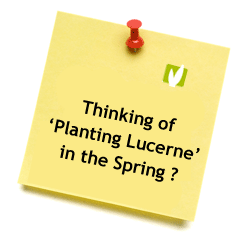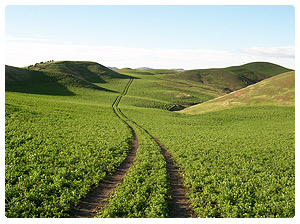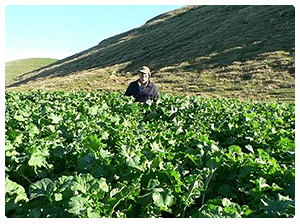|
|
|
Issue 17 / Winter / June 2011
Hi #subname#
Welcome to the June edition of Specialty Seed's SeedData Newsletter.

I have recently been up to Takaka, located in beautiful Golden Bay at the top of the South Island of New Zealand, and I must say the country side at that stage was looking very good.
There seems to be plenty of good looking pasture around and the brassica crops have certainly made the most of the wetter than normal season.
A "perk" of my job is that I see a lot of New Zealand; I normally don't do much sightseeing while away however driving between Blenheim and Kaikoura I stopped off at Ohau stream and visited the juvenile seals playing in the river and the waterfall pool nearby.
They come up the river when mum's out to sea, to socialize.
Check out the following YouTube fur seal pups link to see them for yourself.
While talking to the Department of Conservation officer, who was at the pool during my visit, there would have been around 300 of these seals, either in the pool or up the river that leads into it.
The baby seals have no fear of humans yet and many come up for a pat. Their antics in the water are very amusing and it is a great time waster.
I doubt that there are many places in the world where you can see this so up close and personal. If you are ever passing through this is a must do !
In this edition we will preview:

Winter Weed Control in established Lucerne

Weed control of established Lucerne stands is important and should be done yearly during the months of June and July and to a lesser degree August.
Trial work on weed control on Lucerne stands has shown dry matter yield increases of 57%. My definition of "established Lucerne" is a stand older than 12 months old.
Most of the chemicals suggested in this download require a minimum stand life of at least 12 months while for others 2 years is the minimum stand life requirement (i.e. terbuthylazine).
We have tried to suggest chemicals with the highest active ingredients (a.i.) per litre and strongly recommend that you read all labels before use and seek the help of your local chemical expert before commencing any spraying program.
The chemicals selected are often only a small sample of the range commercially available and us suggesting them doesn't put one above another, however the chemicals suggested are normally easy to obtain and to get a good competitive price on.
Pre Spray:
- Walk the paddocks to inspect the range of weeds present. For help indentifying any common weeds please click here for our
Identifying Pasture Weeds brochure. The most commonly found weeds will be the likes of grass weeds, shepherds purse, storksbill and clovers.
For more difficult to control weeds including nodding thistles, woolly mullein and dandelions please contact us for more information.
- Ensure Lucerne is dormant then closely graze stands and allow a few days after grazing for weed growth to freshen up before spraying.
- Do not apply chemicals when frost is still on the ground or the ground is excessively wet.
Suggested Chemicals:
- Paraquat:
The most commonly used chemical for weed control in established Lucerne is Paraquat.
It is used on its own if grass weeds are the only issue or in a mix with other chemicals (see the downloads below for more information) if there is a wider range of weeds present, which is normally the case.
Paraquat will kill most annual grasses, broadleaf weeds and suppresses ryegrasses and brown off and knock down the other flat weeds present. The addition of a residual chemical to Paraquat will stop them coming back for the spring/summer/early autumn.
The last count I did there were 5 types of Paraquat on the market. They contain 200 or 250 grams / litre (a.i.).
Rate of Paraquat to the hectare when used alone is normally 3 litres per hectare (200 gram/litre a.i.) and 2.4 litres per hectare (250 grams / litre a.i.).
When used in a mix with either Atrazine, Simazine or terbuthylazine all residual chemicals the rates are 2 - 3 litres per hectare (200 gram/litre a.i.) and 1.6 to 2.4 litres per hectare (250 gram/litre a.i.).
For more information on Paraquat please follow these links:
http://www.orioncp.co.nz/pdfs/labels/PQ200%20June%202008.pdf
http://www.syngenta.co.nz/label/syngentanz/GRAMOXONE_24106280.pdf
- Atrazine:
Atrazine is used in addition to Paraquat to control seedling weeds and is a residual chemical. Normally used earlier in the season (i.e. June until mid July). Once again there are several to select from. The Atrazine products I mention both contain 900 grams / kg a.i. and are used at between 800 grams - 1 kg per hectare.
For more information on Atrazine please follow these links:
http://www.orioncp.co.nz/pdfs/labels/ATRAGRANZ.pdf
http://search.nufarm.co.nz/label/nufarmnz/NUTRAZINE%20900%20DF_24107642.pdf
- Simazine:
Like Atrazine, Simazine is a residual chemical used in a mix with Paraquat and it has a similar weed spectrum as Atrazine. You use Simazine for later in the spraying season mid July until early August.
NuFarm's Simazine and Orion's Gesatop both contain 500 grams/litre a.i and therefore when mixed with Paraquat are used at between 1.5 to 2 litres per hectare.
For more information on Simazine please follow these links:
http://www.orioncp.co.nz/pdfs/labels/GESATOP.pdf
http://search.nufarm.co.nz/label/nufarmnz/FLOWABLE%20SIMAZINE_24107597.pdf
- Terbuthylazine:
Terbuthylazine has a similar weed spectrum to Atrazine and Simazine and could be used at the same time as them. Terbuthylazine is also similar to the above chemicals in that it performs best on moist soil types. Once again there is a wide range of terbuthylazine products on the markets many with different strengths of a.i. The following two I have recommended both contain 500 grams per litre a.i. and should be used at between 1.5 and 2 litres per hectare when mixed with Paraquat.
For more information on terbuthylazine please follow these links:
http://www.orioncp.co.nz/pdfs/labels/ASSETT.pdf
http://www.ravensdown.co.nz/ProductInstructions/Terbaflolabel.pdf
|
Website Link: Click here to go to the Specialty Seed's Lucerne website page .
Contact Link: For any questions or enquiries on any brassica please contact us.
Back to top

Goliath forage rape performing well

Back in mid February I had a call from a local client, Mr Peter Kidd, asking what brassica he could drill at that time of the year, to give him good winter feed.
As he was going to be away for a bit the paddock wouldn't be drilled until early March. It was starting to get to the later end of the brassica season so we decided to run with Goliath forage rape. Goliath is relatively new to the market and has performed very well since its introduction, featuring prominently in many winter green feed competitions throughout New Zealand, which backed up the good results Goliath had in its pre commercial release trials.
The paddock was sown at 4 kgs per hectare of Gaucho treated Goliath rape, in the first week of March. Peter applied 100 kgs of Urea and sprayed the paddock once for white butterfly.
Peter and Marie Kidd have a sheep, beef and mixed cropping farm on approximately 400 hectares in McQueen's Valley which is on the Christchurch to Akaroa highway. Marie rung us recently to come and have a look at the crop. The offer of morning tea, which was superb, was all it took to get both David and myself out of the office on a cold wet day to look at it.
The photo on the right here shows quite clearly what a great job Peter and Marie have done in growing this crop, particularly given the late sowing date.
Download Link: Click here to download our Brassica Growing Guide.
Website Link: Click here to go to the Specialty Seed's Brassicas website page .
Contact Link: For any questions or enquiries on any brassica please contact us.
Back to top

Who is PEST GO ?
Over the last couple of months you may have noticed in the SeedData newsletter an advert for Pest Go ?
Pest Go is an internet-based Pest Control Solutions company aimed at bringing costs down for consumers.
Pest Go is able to supply a full range of pest control products delivered direct to your door anywhere in New Zealand.
There are no hidden costs at all within the website. The price you see alongside of the product you are interested in, is the price you pay.
Pest Go has products for the control of Possums, Rats, Mice, Rabbits, Hares, and Other Pests and insects, including our range of specialty products such as CrickOff Pro for the control of black field crickets.
This month we have a special on Ditrac Rodent Baits:
Website Link: Click here to go to the Pest Go Website.
Back to top

As always, we hope this issue has been of some value to you. If you have a comment on this newsletter or anything on our website, please feel free to give us a call on our Freephone: 0800 727 8873, send us an email at: mail@specseed.co.nz.
Kind Regards

Stephen Finch & David Percival
Specialty Seeds - New Zealand
|
|
|

